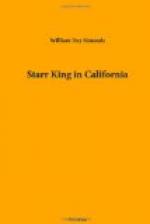Horace Davis, Starr King’s son-in-law, was accustomed to insist that writers had wholly failed to note one element of the great orator’s power, namely, his humor. Not wit, Mr. Davis would remark, but a most genial and kindly, and at the same time illuminating humor. A careful examination of King’s published sermons, speeches and lectures gives but slight evidence of this gift, owing doubtless to false ideas of what constitutes decorum in the work of a preacher. Occasionally satisfying evidence is found of the truth of Mr. Davis’ judgment, as in the following:
“On many a tombstone where it is written, ’Here lies so and so, aged seventy years’, the true inscription would read ’In memory of one who in seventy years lived about five minutes and that was when he first fell in love.’”
Writing of his lecture work in California which he called “detestable vagrancy,” he says:
“There is a great flood in the interior. California is a lake. Rats, squirrels, locusts, lecturers, and other like pests are drowned out. I am a home bird, and enjoy it hugely.”
King greeted the mention of his name as candidate for United States Senator with the statement, “I would swim to Australia before taking a political post,” and added, “a dandy lives from one necktie to another, a fashionable woman from one wrinkle to another and a politician from one election to another. "
Certainly there is a smile, as well as a truth, in the following:
“Our popular definition of a ghost is just the reverse of truth; it makes one consist of a soul without a body, while really a specter, an illusion, a humbug of the eyesight and the touch, is a human body not vitalized through and through with a soul.”
“King was the best story teller of his time,” thought Dr. Bellows. “Gifted with an exquisite, a delicious sense of the ludicrous, and given to bursts of uncontrollable merriment, happy as childhood and as innocent,” this is the verdict of one of his earliest biographers, — E. P. Whipple. That sunny mirth and infectuous laughter was no mean element of his power over the people, we can readily believe.
Another explanation of his far reaching influence both in the pulpit and on the platform, is found in the rare skill with which he made the discoveries of science, and the beauties of nature, serve his need as a teacher of morals and religion. And here, again, he was helped by the spirit of his age. Darwin’s “Origin of Species” was published in 1859, a kind of crown and culmination of a half century of brilliant progress in science. Starr King but shared the temper of his time as he turned with delight to the writings of the masters and reveled in the new universe there revealed. Modern science, which troubled the faith of many, only deepened and strengthened his own, as he idealized and spiritualized each new wonder of earth and heaven. The comet of July, 1861, gave noble opportunity to enforce in his pulpit the religious lessons of that mother of all the sciences, Astronomy. “I am glad,” he began, “at every new temptation to consider in the pulpit and the Church the wonders and laws of modern astronomy.”




